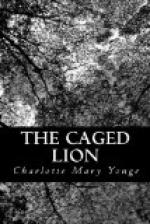But a little reflection convinced him that thus to follow would only bring suspicion on Malcolm and defeat his plans; and that it were better to obtain some certain information ere the King should come home, and have to interfere with a high hand; and Malcolm’s arguments about his obligations as a captive, too, had their effect. He perceived his own incapacity to act; and in his despair at nothing being done consented to risk Malcolm in the search, while he himself should proceed to the King, only ascertaining on the way that Lilias was not at Whitby. And so, in grief and anxiety, the cousins parted, and Malcolm alone durst speak a word of hope.
CHAPTER XVII: THE BEGGING SCHOLAR
‘The poor scholar,’ now only existing in Ireland and Brittany—nay, we believe extinct there since the schoolmaster has become not abroad, but at home, in Government colleges—was to be found throughout the commonwealth of Europe in the Middle Ages. Young lads, in whom convent schools had developed a thirst for learning, could only gratify it by making their way to some university, where between begging, singing, teaching, receiving doles, earning rewards in encounters of wit and learning, doing menial services and using all manner of shifts, they contrived to live a hard life, half savage on the one side, highly intellectual upon the other. They would suck the marrow of one university, and then migrate to another; and the rank they had gained in the first was available in the second, so that it was no means uncommon for them to bring away degrees from half the universities in Europe, all of which formed one general system—all were like islands of one country, whose common language was queer Latin, and whose terms, manners, and customs were alike in all main points.
Scotland contributed many of her sons to this curious race of vagabond students, when she herself was without any university to satisfy the cravings of her thoughtful and intellectual people. ’No country without a Scot or a flea’ was an uncomplimentary proverb due to the numerous young clerks, equally fierce for frays and for lectures, who flocked to the seats of learning on the Continent, and sometimes became naturalized there, sometimes came home again, to fight their way to the higher benefices of the Church, or to become councillors of state.
It was true that Malcolm was an Oxford scholar, or rather bachelor, and that Oxford and Cambridge were almost the only universities where Scots were not—their place being taken by multitudinous Irish; yet not only were all universities alike in essentials, but he had seen and heard enough of that at Paris to be able to personate a clerk from thence.




